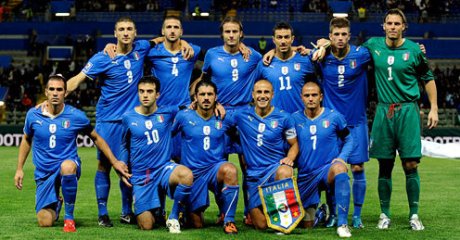Italy and their fans will doubtless be crushed by today’s defeat to Slovakia at Ellis Park which sees Marcello Lippi’s side eliminated at the first hurdle of the World Cup having provided only a limp defence of their title.
A campaign defined by an uncharacteristic sloppiness in defence and a lack of cohesion throughout the team has unquestionably brought the curtain down on the “2006 generation” of Italian players, Fabio Cannavaro, Gianluigi Buffon, Gianluca Zambrotta, Mauro Camoranesi, Andrea Pirlo and Gennaro Gattuso all unlikely to feature for their country again as Lippi departs his post to be replaced at the helm by Cesare Prandelli.
Clearly Italy’s elimination from the World Cup is hugely disappointing for all involved with the squad, but, though the situation may seem desperate in the short-term, there are positives for the team moving forward from this low point in the recent history of Italian football.
A fresh start?
Perhaps the most encouraging aspect of the Azzurri’s immediate future is that Prandelli’s appointment represents the chance for the team to have a completely fresh start. Lippi has been in charge of the national team on and off since 2004 – a two-year hiatus when Roberto Donadoni took over after the 2006 tournament his only time away – and has been accused of being stuck in his ways having demonstrated a doggedness, something often interpreted as sheer bloody-mindedness, in his methods and selections over the years.
Where Lippi staunchly stuck by the players that won him the World Cup four years ago despite their advancing years, Prandelli has a chance to allow a new generation of Italian talent the chance to prove themselves on the international stage. With a significant number of the current squad set to move on, Prandelli has been handed a wonderful opportunity to build afresh and construct a new team which has the potential to mount a serious challenge in Poland and Ukraine at Euro 2012.
A handful of relatively young players have already made an impact with the senior side, the likes of Giorgio Chiellini, Daniele De Rossi, Domenico Criscito, Giuseppe Rossi and Riccardo Montolivo all seemingly set to provide the crux of a new-look Italian squad. Those established names are likely to be joined in the national team set-up by players that have only had brief opportunities with the Azzurri thus far, names such as Claudio Marchisio, Antonio Candreva, David Santon and Salvatore Bocchetti springing to mind.
New players, new ethos, new balance
Starting from the ground up, Prandelli has the time to instill in this new group of players the precise tactical blueprint and mentality that he wants them to adopt in the long-term. An avid exponent of an attacking 4-2-3-1/4-4-1-1 during his time at Fiorentina, a formation that, despite a poor second-half to the 2009/10 season, brought him great success during his five years at Stadio Artemio Franchi, Prandelli likes his teams to be fearless going forward and yet compact and robust without the ball. Although he built La Viola with a general attacking ethos, Prandelli’s side were consistently one of the strongest defensive outfits in Serie A under his stewardship, a fact that often gets overlooked.
This balance between a sound defence and a sharpness in front of goal is exactly what Italy has been crying out for for some time now. Under Lippi the Azzurri were generally very strong at the back but often struggled without an out-and-out centre-forward, Luca Toni having lost from after an impressive World Cup in Germany and Alberto Gilardino having struggled for consistency at times during his international career. Prandelli now has two years to find the prolific striker Italy have been missing, perhaps making Mario Balotelli a regular member of the squad or giving this key role to Pazzini or Marco Borriello – two players that have enjoyed excellent domestic form – with Rossi in support as a deep-lying playmaker.
Whichever personnel the new Coach opts to select, it is vital that he finds his best eleven relatively quickly. One of the most negative aspects of the latter part of Lippi’s reign was his seemingly muddled thinking as to what was his most effective team, chopping and changing players and formations (4-4-2, 4-3-3, 4-2-3-1 and 4-3-1-2 all having been used with mixed results in the last year) and not creating the balanced and settled environment which had been so crucial to the team’s success in 2006.
Resurrecting a fallen giant
Despite his flaws, Lippi is surely one of the greatest managers Europe has seen in modern times and will be difficult to replace, but Prandelli is an astute Coach with a sharp mind who did a superb job in rebuilding Fiorentina in the wake of the Calciopoli scandal. The former Juventus player will need to perform to a similarly impressive level under even greater media scrutiny if the Azzurri are to shake off the negative impacts of their humiliating performance in South Africa and return to their usual strength by the time Euro 2012 rolls around.
It may look an almost insurmountable challenge in the face of today’s defeat but, with a raft of gifted young players coming through, the next few years look like they could be an exciting time for the Azzurri. Prandelli will have all the raw materials he needs to succeed at his disposal when he takes the reigns from Lippi in the next few weeks, and it is up to him to optimise what is available to him in order to revive the fortunes of his country, a giant of world football that has, albeit temporarily, fallen.





